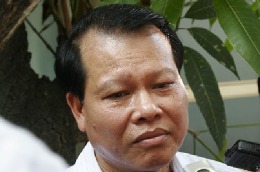Minister of Finance Vu Van Ninh provides details of the State budget for
state-owned groups and corporations in 2011 and defines their role in the
economy.
 In the 2011 State budget plan presented to the National Assembly Standing
Committee there is an item channelling VND5,180 billion ($265,5 million) to
State groups and corporations to conduct infrastructure projects. Does this mean
that the State budget for State groups and corporations will increase in 2011?
In the 2011 State budget plan presented to the National Assembly Standing
Committee there is an item channelling VND5,180 billion ($265,5 million) to
State groups and corporations to conduct infrastructure projects. Does this mean
that the State budget for State groups and corporations will increase in 2011?
That money is not capital granted to the groups; it is the money that the State
provides groups to conduct tasks of the State. As they are State tasks, it must
give money to groups to do them. For instance, developing a power network in the
central highlands is not sufficiently profitable for Electricity of Vietnam. But
the National Assembly and the government see that it is necessary to develop a
power network in the region, so the government provides funding to EVN to
complete the task. That is not capital for the group.
Only the provision of VND3,500 billion ($175 million) to PetroVietnam is
different. The money is for conducting some national targeted projects. The
group should have been able to keep all its after-tax profit.
That is normal practice, with enterprises channelling it into their own funds.
But because oil is a national natural resource, the State takes 50 per cent of
PetroVietnam’s after-tax profit. VND3,500 billion ($175 million) is less than 50
per cent and is for the group to conduct national targeted projects. Another
example is the Dung Quat Oil Refinery. One part of its investment capital is
from the State budget and one part from PetroVietnam’s borrowings. Later on,
when we allow the group to manage the refinery we will also allow it to manage
State capital in the refinery.
Basically, we do not now grant capital to State groups or enterprises.
Does the government have plans to create more access for non-state
enterprises to participate in State budget-funded national projects?
It would be very good if they were capable of participating. We would have more
channels to raise capital for the projects.
So they can’t participate because they are incapable?
It would be very good if they were capable of participating.
How do you define the roles of state-owned enterprises and non-state
enterprises in the economy?
The main standpoint is that we encourage the development of all economic
sectors.
State-owned enterprises are the pillars of the economy. But this does not mean
that all preferential treatment goes to state-owned enterprises. There are areas
that private enterprises cannot or do not cover as they are not lucrative
enough. But as they are still necessary for the development of the economy,
state-owned enterprises are involved. Besides, as the State wants to control the
economy, state-owned enterprises must hold the controlling role in some sectors.
State groups and commercial banks are also being equitised. The State only holds
a controlling share in those enterprises, not 100 per cent.
With recent developments in the milk and pharmaceutical markets [unreasonably
high prices and questionable quality], some people are calling for more control
from the State in those markets. Because the State does not hold control in
those markets, it cannot control distribution. So it is worth considering
whether the State should increase control over those markets.
Is there a possibility that public debt will reach 60 per cent of GDP in 2011?
The National Assembly Finance and Budget Committee has warned that public debt
should be kept under the limit of 60 per cent of GDP. Actual estimates show that
public debt is standing at only 56 per cent of GDP.
Previously we did not have a concept of public debt. Instead, we used a concept
of government debt and national foreign debt.
The government plans to issue government bonds worth VND45,000 billion ($2.3
billion) in 2011 to fund infrastructure projects. What is the intended interest
rate on the bonds?
Government bonds are sold through auctions, where the interest rate is
determined. The general management direction is that we keep the interest rate
as low as possible. Since the beginning of this year government bond interest
rates have been gradually falling.
“Eradicating discrimination among economic sectors; eradicating all kinds of
subsidy and preferential treatment for state-owned enterprises; counting
correctly and fully all costs of their products, so putting state-owned
enterprises on a level playing field with enterprises in other sectors.
State-owned groups and corporations must focus on key sectors of the economy and
focus on their main business. They must conduct compulsory auditing.”
Prime Minster Nguyen Tan Dung – “Solutions for Enhancing the Investment
Environment and Production Development”, in the Government’s report on the
socio-economic situation in 2010 and plans for 2011.
Source: VnEconomy
- © Copyright of Vietnamnet Global.
- Tel: 024 3772 7988 Fax: (024) 37722734
- Email: evnn@vietnamnet.vn